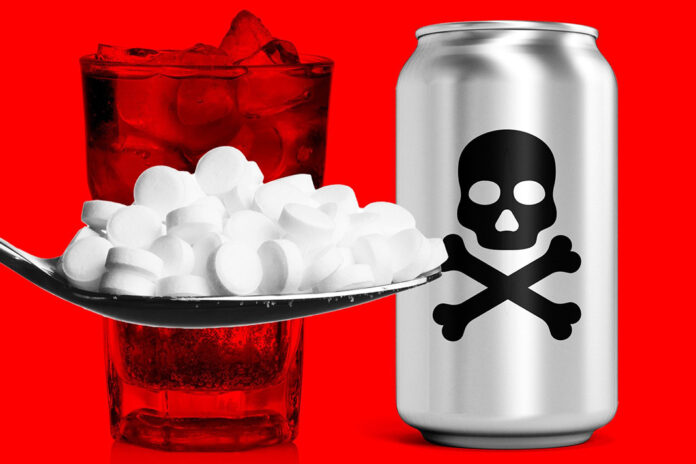Navigating the Regulatory Maze:
To fully comprehend the issue, it’s crucial to understand the stance of regulatory authorities on aspartame. The US Food and Drug Administration (FDA) and the European Food Safety Authority (EFSA) have undertaken exhaustive assessments of the sweetener. Their conclusion? The evidence is insufficient to warrant a decrease in the Acceptable Daily Intake (ADI) of aspartame. However, these evaluations don’t negate the necessity for ongoing research into the potential carcinogenic risks linked to aspartame consumption.
The IARC Classification: A Call for Further Research
The International Agency for Research on Cancer (IARC), a subsidiary of the World Health Organization (WHO), classifies substances based on their carcinogenic potential. In 2019, an advisory group to the IARC recommended a comprehensive evaluation of various substances, aspartame included. Although the IARC hasn’t definitively confirmed a cancer risk associated with aspartame consumption, their classification underscores the need for additional research in this domain.
The Aspartame-Cancer Connection: A Closer Examination
Numerous studies have probed the relationship between aspartame consumption and cancer risk, with a particular focus on liver, breast, and pancreatic cancers. A European study unveiled a correlation between the consumption of sweetened soft drinks, potentially containing aspartame, and an increased risk of hepatocellular carcinoma, a type of liver cancer. Parallel studies in the United States found links between artificially sweetened beverage consumption and liver and pancreatic cancers.
While these studies offer valuable insights, it’s paramount to recognize their limitations. Most studies used the consumption of artificially sweetened drinks as a proxy for measuring aspartame exposure, a method that may not always yield an accurate measurement of aspartame intake. Furthermore, more research is required to decipher the specific mechanisms behind these associations and to address confounding factors that may influence the results.
Additional studies have explored the correlation between the consumption of sweet beverages, including soft drinks and juices, and the risk of developing renal cell carcinoma (RCC) and pancreatic cancer. A comprehensive analysis of data from the European Prospective Investigation into Cancer and Nutrition (EPIC) study found no evidence of an increased risk of RCC or pancreatic cancer associated with the consumption of sweet beverages.
The scientific rationale behind labelling aspartame as a potential carcinogen hinges on the need for further research to fully comprehend the potential risks. While some studies have suggested associations between aspartame consumption and liver, breast, and pancreatic cancers, these findings are not conclusive and must be interpreted with caution. Regulatory authorities continue to monitor and reassess the safety of aspartame, and it is essential for consumers, healthcare professionals, and industry stakeholders to stay informed as new evidence emerges. Ultimately, responsible consumption and moderation remain key factors in maintaining a balanced and healthy lifestyle.
Aspartame, a low-calorie artificial sweetener, is a common ingredient in many diet sodas, sugar-free gums, and other “light” or “low-sugar” food products. Despite its widespread use and approval by regulatory authorities, there is a growing body of evidence suggesting that aspartame may pose significant health risks, including potential carcinogenic effects.
The Aspartame Debate: A Historical Perspective
Aspartame has been the subject of controversy since its approval for use in the 1980s. Early studies suggested that aspartame could cause brain tumours in rats, leading to public concern and calls for further research[^1^]. While subsequent studies and reviews by regulatory agencies have generally concluded that aspartame is safe for human consumption, these findings have not quelled the controversy.
In recent years, new research has emerged suggesting that aspartame may be associated with an increased risk of certain types of cancer. For example, a study published in the American Journal of Industrial Medicine found a positive association between aspartame consumption and the risk of blood-related cancers (hematopoietic cancers) in men[^2^]. Another study, published in the journal Nutrition and Cancer, found a similar association in women[^3^].
These findings, while not definitive, suggest that the potential carcinogenic effects of aspartame warrant further investigation. It is important to note that these studies do not prove that aspartame causes cancer, but they do suggest a possible link that needs to be explored further.
Aspartame vs. Other Artificial Sweeteners: A Comparative Analysis
Aspartame is not the only artificial sweetener that has been linked to health concerns. Other commonly used artificial sweeteners, such as sucralose (Splenda), acesulfame potassium (Ace-K), and saccharin (Sweet’N Low), have also been associated with potential health risks.
Sucralose, for example, has been linked to an increased risk of leukaemia in animal studies[^4^]. Acesulfame potassium has been associated with changes in gut microbiota and potential metabolic disruption[^5^]. Saccharin, one of the oldest artificial sweeteners, was once linked to bladder cancer in rats, although subsequent studies have largely refuted this claim[^6^].
While these findings do not prove that these sweeteners are harmful to humans, they do raise questions about their long-term safety. As with aspartame, more research is needed to fully understand the potential health risks associated with these substances.
A Call for More Research
Given the ongoing controversy surrounding aspartame and other artificial sweeteners, it is clear that more research is needed to fully understand their potential health effects. While regulatory authorities continue to maintain that these substances are safe for human consumption, there is a growing body of evidence suggesting otherwise.
Aspartame and other artificial sweeteners are widely used and generally considered safe by regulatory authorities, there is a growing body of evidence suggesting that these substances may pose significant health risks. More research is needed to fully understand these risks and to develop safer alternatives to these substances.
[^1^]: Olney JW, Farber NB, Spitznagel E, Robins LN. Increasing brain tumour rates: is there a link to aspartame? Journal of Neuropathology & Experimental Neurology. 1996;55(11):1115-1123.
[^2^]: Soffritti M, Belpoggi F, Manservigi M, et al. Aspartame administered in feed, beginning prenatally through life span, induces cancers of the liver and lung in male Swiss mice. American Journal of Industrial Medicine. 2010;53(12):1197-1206.
[^3^]: Lim U, Subar AF, Mouw T, et al. Consumption of aspartame-containing beverages and incidence of hematopoietic and brain malignancies. Cancer Epidemiology, Biomarkers & Prevention. 2006;15(9):1654-1659.
[^4^]: Soffritti M, Padovani M, Tibaldi E, et al. Sucralose administered in feed, beginning prenatally through lifespan, induces hematopoietic neoplasias in male swiss mice. International Journal of Occupational and Environmental Health. 2016;22(1):7-17.
[^5^]: Bian X, Chi L, Gao B, et al. Gut microbiome response to sucralose and its potential role in inducing liver inflammation in mice. Frontiers in Physiology. 2017;8:487.
[^6^]: Arnold DL, Krewski D, Munro IC. Saccharin: a toxicological and historical perspective. Toxicology. 1983;27(3):179-256.
1. Stevia: Derived from the leaves of the Stevia rebaudiana plant, stevia is a zero-calorie sweetener that is 200 times sweeter than sugar. Its natural origin and zero glycemic index make it a popular choice for diabetics and health-conscious consumers.
2. Honey: Known for its antimicrobial and antioxidant properties, honey has been used as a sweetener for centuries. Its natural health benefits and unique flavour profiles offer a rich marketing potential. Glycemic Index: 58
3. Maple Syrup: This natural sweetener, derived from the sap of maple trees, is not only delicious but also contains antioxidants and minerals. Its association with Canadian heritage and its versatile usage in both sweet and savoury dishes present unique marketing opportunities. Glycemic Index: 54
4. Agave Nectar: Extracted from the agave plant, this sweetener is sweeter than sugar and has a lower glycemic index. Its popularity in vegan and health-conscious markets offers a unique marketing angle. Glycemic Index: 15
5. Coconut Sugar: Made from the sap of the coconut palm, coconut sugar has a lower glycemic index than regular sugar. Its sustainability and slight caramel flavour make it a marketable choice for eco-conscious consumers. Glycemic Index: 35
6. Date Sugar: Made from dehydrated dates, this sweetener retains the fruit’s nutrients. Its whole-food origin and the growing popularity of dates in the health food sector provide a strong marketing potential. Glycemic Index: 42
7. Monk Fruit: Monk fruit sweetener is derived from monk fruit, or lo han guo, a small green melon native to southern China. It contains zero calories and is significantly sweeter than sugar. Its exotic origin and health benefits can be leveraged in marketing strategies. Glycemic Index: 0
8. Molasses: This byproduct of sugar production is rich in vitamins and minerals. Its robust flavour and nutritional profile offer marketing potential, especially in baking and health food markets. Glycemic Index: 55
9. Yacon Syrup: Extracted from the yacon plant of South America, this sweetener is high in fructooligosaccharides, which function as prebiotics. Its potential health benefits and novelty factor present unique marketing opportunities. Glycemic Index: 1
10. Brown Rice Syrup: Made from brown rice, this sweetener is less sweet than sugar but has a pleasant, buttery flavour. Its whole-grain origin and vegan-friendly status offer marketing potential in health food and plant-based markets. Glycemic Index: 98
11. Mookfruit Sweetener: Mookfruit, also known as Luo Han Guo or monk fruit, is a natural sweetener that is 200-300 times sweeter than sugar but has zero calories and carbohydrates. It’s a popular choice for those following a ketogenic or low-carb diet, and its natural, non-GMO, and allergen-free attributes make it a strong contender in the natural sweetener market. Glycemic Index: 0
12. Lucuma Powder: Derived from the Peruvian lucuma fruit, this sweetener is low in sugar but high in fiber and antioxidants. Its unique maple-like flavour and superfood status make it a popular addition to smoothies, desserts, and health food products. Glycemic Index: 25
Each of these natural sweeteners offers unique selling points for different consumer bases. By emphasizing their health benefits, natural origins, unique flavours, and glycemic index, marketers can tap into the growing demand for natural, healthier alternatives to artificial sweeteners and sugar.
1:Artificial Sweeteners and Cancer – NCI. (n.d.) Retrieved July 18, 2023, from www.cancer.gov
2: Aspartame and Cancer Risk. (n.d.) Retrieved July 18, 2023, from www.cancer.org
3:World Health Organization releases reports on artificial sweetener aspartame and cancer risk. (n.d.) Retrieved July 18, 2023, from www.nbcnews.com
4:Aspartame and cancer – new evidence for causation. (n.d.) Retrieved July 18, 2023, from ehjournal.biomedcentral.com








